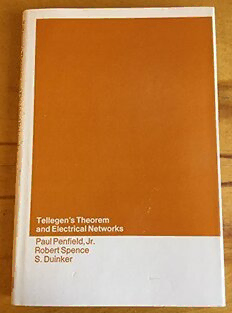Table Of ContentT ellegen•s Theorem and
Electrical Networks
Paul Penfield, Jr., Robert Spence, and Simon Duinker
The MIT Press
1111111
This file has b8(1na uthorized Md prcwidedb y the
publisher.T ho MIT Press. as s:,ar'ol f its ongoi,,9 otrorts
to me.-ka.eva aable In digit~ f0tm older titles tht\t are no
longer readily available.
This Ille Is 1>1ovlC1tehdro ugh lhe 1nteme1A rehive for
llbrary lending, and no forther reproduotion Qr
distribution is allowed except as permitted by
applicable law or in writing by the MfT Press.
Tellegen's Theorem
and Electrical Networks
TELLEGEN'ST HEOREM
AND ELECTRICALN ETWORKS
Paul Penfield, Jr., Robert Spence, and Simon Duinker
Research Monograph No . 58
The M.I.T. Press
llll\l
Cambridge, Massachusetts,
and London, England
MIT Preaa
0262160323
PENFIELD
n1 t EGENT HEOREM
Copyrl{lhl 1970 by
~
TM Massacluuett.tI nstitute of Technology
Set in Monotype Timu Roman.
Printed and bound in the United States of Amerka
by 77,e ColonialP reu Inc.
All rig/tis reseroed.N o part of this book may be
reproducedi n any form or by any means,
electronico r mechanlc;a/i,n cludingp hotocopyllf(Ir, ecording,
or by any informationa tor(l{Jaen d retrkoal system,
wit/routp ermiulon in writingf rom the publisher.
ISBN O2 62 16032 3 (hardcover)
Library of Colf(/reuc atalog card number: 70-103900
To Professor Dr. Ir. B. D. H. Tellegen
Table of Contents
Foreword •
XI
...
Preface
Xlll
1 Introduction
1
2 Proof of Tellegen's Theorem
4
2.1 Notation
4
2.2 Kirchhoff's Laws 5
2.3 Actual-Power Theorem 6
2.4 Quasi-Power Theorem 7
2.5 Example
8
2.6 Alternative Derivations of the Quasi-Power Theorem IO
2.7 Kirchhoff Operators
11
2.8 General Form of Tellegen's Theorem 14
2.9 Weak Forms of Tellegen's Theorem 15
2.10 Ideal Transformers 15
2.11 Two-Network Form ofTellegen's Theorem 17
2.12 Dual Form of Tellegen's Theorem 17
2.13 Wave Variables 17
2.14 Tellegen's Theorem in Wave Variables 18
2.15 Vector-Space Statement ofTellegen's Theorem 19
2.16 Proof of Kirchhoff's Laws from Tellegen's Theorem 21
2.17 Summary 22
3 Applications to Arbitrary Networks 23
3.1 Instantaneous-Power Theorem 23
3.2 Small-Signal Power Theorem 24
3.3 DC and AC Power Theorems 25
..
Vil
TABLE OF CONTENTS
v111
3.4 Frequency-Domain Theorems 26
3.5 Theorems about Stochastic Variables 27
3.6 Ramo's Theorem 28
3.7 Wolaver's Four-Basket Theorem 28
3.8 Wolaver's Three-Basket Theorem 30
3.9 Wolaver's Two-Basket Theorem 32
33
4 Applications to Nonlinear Networks
4.1 Uniqueness 33
4.2 Duffin's Impossibility Theorem 35
4.3 Heaviside's Transient Theorem 35
4.4 Content and Cocontent 37
4.5 Variational Principles for Content and Cocontent 39
4.6 Voltage Minimax Theorem 42
4.7 Current Minimax Theorem 43
4.8 Nonlinear-Capacitor Networks 44
4.9 Nonlinear-Inductor Networks 45
4.10 Dissipation Delay 45
47
5 Applications to Linear Networks
5.1 Conservation of Real and Reactive Power 47
5.2 Energy Theorem for RLC Networks 48
5.3 Dicke's Restriction on Incident Power 48
5.4 Impedance 49
5.5 Reciprocity 50
5.6 Antireciprocity 51
5.7 Interreciprocity 52
5.8 Properties of Driving-Point Impedances 52
5.9 Relations between Port and Element Impedance Matrices 53
55
5.10 Van der Pol's Transient Theorem
5.11 Tellegen's Equivalence Theorem 56
5.12 Invariance of the Ratio of Open-Circuit to
Short-Circuit Impedances 58
5.13 Huang-Lee Impedance Restriction 59
5.14 Lunelli's Decomposition Theorems 62
5.15 Reactance Theorem 63
5.16 Frequency Variation of Transmission 64
5.17 Group Delay and Stored Energy 65
5.18 Uniqueness 67
5.19 Resonance 68
5.20 Conditions for Resonance 68
5.21 Formulas for Resonant Frequency 69
5.22 Orthogonality in Resonant Systems 71
5.23 Sensitivity of Resonant Frequency 73
5.24 Foster's Topological Theorem 74
5.25 Guillemin's Quasi-Orthogonality 76
5.26 Equivalent Noise Temperature of a One-Port Network 77
'
TABLE OF CONTENTS
1x
6 Applications to Sensitivity and Variable Networks 79
6.1 Cohn's Theorem 79
6.2 Cohn's Theorem for Reciprocal Networks 81
6.3 Cohn's Theorem for Nonreciprocal Networks 82
6.4 Cohn's Theorem for Multiport Networks 82
6.5 Complex Cohn's Theorem 84
6.6 Complex Cohn's Theorem for Isoclinic-Power Networks 84
6.7 Complex Cohn's Theorem for Lossless Networks 85
6.8 Cohn's Theorem for Isoclinic-Impedance Networks 86
6.9 · Higher-Order Sensitivities 87
6.10 Pezaris' Theorem 90
6.11 Pezaris' Theorem for Nonreciprocal Networks 91
6.12 Hines' Theorem 92
6.13 Further Switching Theorems 93
6.14 Shannon-Hagelbarger Concavity Theorem 96
6.1 5 Black's Attenuator Theorem 97
6.16 Bilinear Theorem 99
6.17 Shekel's Similarity Theorem 100
6.18 Saito-Ikeda Attenuator Sensitivity Theorem 101
6.19 Martinelli-Roveri Sensitivity Theorem • 103
6.20 Martinelli-PoggelliS ensitivity Theorem 104
7 Applications to Network Synthesis 107
7.1 Automated Network Design 107
8 Extensions to Other Physical Systems 109
8.1 Other Lumped Systems 109
8.2 Electromagnetic Fields 110
8.3 Electron Beams and Plasmas 111
8.4 Quantum Mechanics 111
8.5 Hamilton's Principle 111
8.6 Momentum Theorems 112
Appendix A. Kirchhoff Operators 113
Appendix B. Wave Variables in Complex Form 116
Appendix C. Indefinite Forms versus Definite Forms 118
Appendix D. Adjoint Networks 119
References 121
Author Index 129
Subject Index 131
Foreword
This is the fifty-eighth volume in the M.I.T. Research Monograph
Series published by the M.I.T. Press. The -objective of this series is to
contribute to the professional literature a number of significant pieces
of research, larger in scope than journal articles but normally less
ambitious than finished books . We believe that such studies deserve a
wider circulation than can be accomplished by informal channels,
and we hope that this form of publication will make them readily
accessible to research organizations, libraries, and independent workers.
Howard W. Johnson
.
XI

